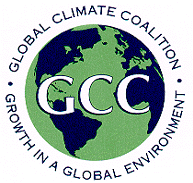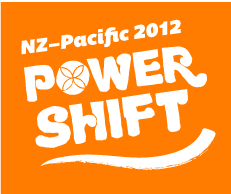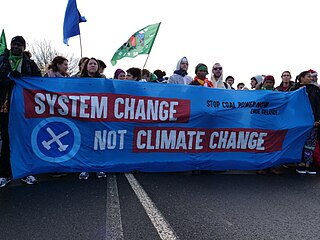
The Global Climate Coalition (GCC) (1989–2001) was an international lobbyist group of businesses that opposed action to reduce greenhouse gas emissions and engaged in climate change denial, publicly challenging the science behind global warming. The GCC was the largest industry group active in climate policy and the most prominent industry advocate in international climate negotiations. The GCC was involved in opposition to the Kyoto Protocol, and played a role in blocking ratification by the United States. The coalition knew it could not deny the scientific consensus, but sought to sow doubt over the scientific consensus on climate change and create manufactured controversy.

Beginning in late 2002 and continuing after the 2003 invasion of Iraq, large-scale protests against the Iraq War were held in many cities worldwide, often coordinated to occur simultaneously around the world. After the biggest series of demonstrations, on February 15, 2003, New York Times writer Patrick Tyler claimed that they showed that there were two superpowers on the planet: the United States and worldwide public opinion.
The European Social Forum (ESF) was a recurring conference held by members of the alter-globalization movement. In the first few years after it started in 2002 the conference was held every year, but later it became biannual due to difficulties with finding host countries. The conference was last held in 2010. It aims to allow social movements, trade unions, NGOs, refugees, peace and anti-imperial groups, anti-racist movements, environmental movements, networks of the excluded and community campaigns from Europe and the world to come together and discuss themes linked to major European and global issues, in order to coordinate campaigns, share ideas and refine organizing strategies. It emerged from the World Social Forum and follows its Charter of Principles.

Power Shift is an annual youth summit which has been held in New Zealand, Australia, Canada, the United Kingdom and the United States. Other Power Shift Conferences are also being organised by members of the International Youth Climate Movement including Africa, Japan and India. The focus of the events is on climate change policy.

The 31st G8 summit was held on 6–8 July 2005 at the Gleneagles Hotel in Auchterarder, Scotland and hosted by Prime Minister Tony Blair. The locations of previous G8 summits to have been hosted by the UK include: London ; and Birmingham (1998). It is the first G8 summit to be held in Scotland. A sixth UK summit was held in Lough Erne in 2013; and a seventh UK summit was held in Carbis Bay in 2021.

Stop Climate Chaos is a coalition of non-governmental organizations (NGOs) in the United Kingdom that focuses on climate change. It was established in September 2005 and is known for running the "I Count" campaign from 2006 to 2007. In addition, the coalition organized 'The Wave" on 5 December 2009 as a lead-up to the UN talks in Copenhagen.

On 15 February 2003, a coordinated day of protests was held across the world in which people in more than 600 cities expressed opposition to the imminent Iraq War. It was part of a series of protests and political events that had begun in 2002 and continued as the invasion, war, and occupation took place. The day was described by social movement researchers as "the largest protest event in human history".

On September 24, 2005, many protests against the 2003 invasion of Iraq and the Iraq War took place.

The proposed invasion of Afghanistan prompted protests with mass demonstrations in the days leading up to the official launch of the war on October 7, 2001. The continuation of the war in Afghanistan from 2001 to 2021 lead to further protest and opposition to hostilities.

Global Day of Action is a direct action protest format. Environmentalism initiatives began to use it in 2005 in connection with Global Climate Campaign. They aimed to focus world attention on the anthropogenic effect that humans are having on global warming. Its main objective is to spearhead demands that elected representatives of their respective governments honor commitments set forth by the Kyoto Protocol, by conducting in unison peaceful demonstrations around the world. The demonstration, or rallies, are intended to coincide with the United Nations Framework Convention on Climate Change (UNFCCC), a meeting of world leaders from 189 nations, that meet annually to discuss climate change.

Power Shift Network is a North American non-profit organization made up of a network of youth-led social and environmental justice organizations working together to build the youth clean energy and climate movement. It runs campaigns in the United States and Canada to build grassroots power and advocate for tangible changes on climate change and social justice at local, state, national and international levels in North America. The organization changed its name from Energy Action Coalition in July 2016 in order to reflect its new leadership and it shift from a coalition to a network structure. The Power Shift Network's members, which include other non-profit organizations and student groups focused on environmental justice, social justice, and climate change, focus their organizing and campaigns on campuses, communities, corporate practices, and politics. The Power Shift Network is part of the Global Youth Climate Movement.
The UK Youth Climate Coalition (UKYCC) is a non-profit youth organisation in the United Kingdom. It is part of The Climate Coalition in the UK

The anti-austerity movement in the United Kingdom saw major demonstrations throughout the 2010s in response to Conservative-Liberal Democrat coalition government's austerity measures which saw significant reductions in local council budgets, increasing of university tuition fees and reduction of public spending on welfare, education, health and policing, among others. Anti-austerity protests became a prominent part of popular demonstrations across the 2010s, particularly the first half of the decade.

The 2011 anti-cuts protest in London, also known as the March for the Alternative, was a demonstration held in central London on 26 March 2011. Organised by the Trades Union Congress (TUC), it was a protest march against planned public spending cuts by the Conservative-Liberal Democrat coalition government that was formed in May 2010.

The anti-austerity movement in Ireland saw major demonstrations from 2008 to 2015.

The 2012 United Nations Climate Change Conference was the 18th yearly session of the Conference of the Parties (COP) to the 1992 United Nations Framework Convention on Climate Change (UNFCCC) and the 8th session of the Meeting of the Parties (CMP) to the 1997 Kyoto Protocol. The conference took place from Monday 26 November to Saturday 8 December 2012, at the Qatar National Convention Centre in Doha.

The People's Assembly Against Austerity is a political organisation based in the United Kingdom that was originally set up to end and reverse the country's government-instituted austerity programme.

The Stop the War Coalition (StWC), informally known simply as Stop the War, is a British group that campaigns against the United Kingdom's involvement in military conflicts.

The climate movement is a global social movement focused on pressuring governments and industry to take action addressing the causes and impacts of climate change. Environmental non-profit organizations have engaged in significant climate activism since the late 1980s and early 1990s, as they sought to influence the United Nations Framework Convention on Climate Change (UNFCCC). Climate activism has become increasingly prominent over time, gaining significant momentum during the 2009 Copenhagen Summit and particularly following the signing of the Paris Agreement in 2016.

The September 2019 climate strikes, also known as the Global Week for Future, were a series of international strikes and protests to demand action be taken to address climate change, which took place from 20 to 27 September 2019. The strikes' key dates were 20 September, which was three days before the United Nations Climate Summit, and 27 September. The protests took place across 4,500 locations in 150 countries. The event stemmed from the Fridays for Future school strike for climate movement, inspired by Swedish climate activist Greta Thunberg. The Guardian reported that roughly 6 million people participated in the events, whilst 350.org – a group that organised many of the protests – claim that 7.6 million people participated.


















